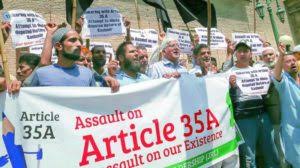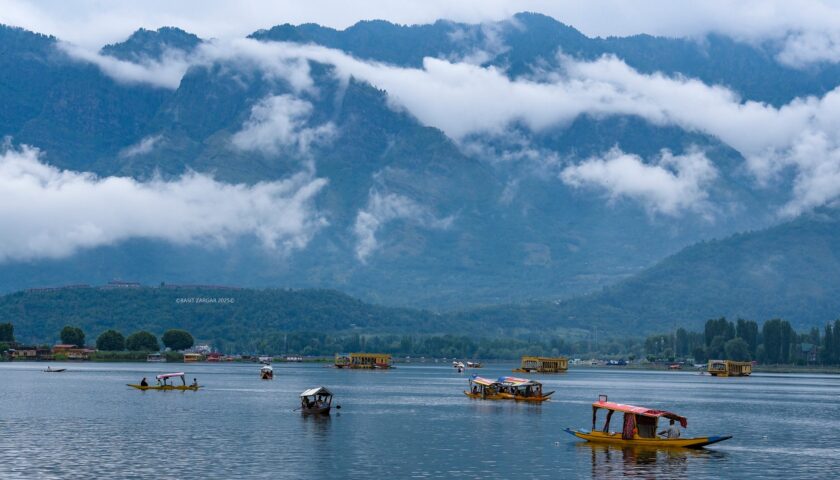‘Listen as the crowd would sing:
Now the old king is dead, Long live the King, ( King Louis XV1) Alone before he was executed)
Dear God , guide us and protect us, ‘we are too young to reign , people of Kashmir are voting again.’
If only as an experiment India held a referendum to ascertain and decide if they want to retain A-35 or scrap it, a political solution to a political problem was in sight. This would be the route taken by all democratic countries of the world if they faced a situation that impinged on the over-arching constitution applicable in that part of the country. India has overwhelming military force in Kashmir but they call governance here an extension of India’s Liberal democracy and free market economy model promoting Liassic faire dealings with client population. The challenge to the presidential order of 1954 proclaiming 35- A instrument as binding, the case now pending in Supreme Court of India was transmuted to confirm the State Subject Law already entrenched in governing customary laws. All important subjects that staked future lives must be placed in public domain. The first call should have been taking a vote from people by taking the case from Law chambers to a referendum. Britain has set the scene for liberal democracy for the world and as examples to cite they dared a referendum for Scots to cede from the country that turned out against secession. Few more votes and Great Britain was divided but they took the risk of having a referendum. Another referendum to sever ties with European Union in Brexit resulted in the impending breakup of EU and one more referendum in Northern Ireland kept the Irish acceded.
Casting votes has been played out with unwilling people of Kashmir over and over again for gaining political power to rule over them. The first rank of local bodies called Panches and Sarpanches are in the process of being groomed. They get adopted by legislative parties and will be used as a platform for canvassing. In the aftermath this process will be used to install permissive governance that will navigate pre-determined political agenda from the centre. A-35 will remain making news and pivotal fulcrum for politicians to dance round.
Future Sarpanches will start making rounds. People as an education must be made aware of the politics of balloting. A ballot in hand is a power cell. This is what the aspirants in politics want people to give them. Candidates confront public with previous performance and future promises. It may be for this reason National Conference party have pulled out of the Sarpanch elections because people will demand promises for keeping their State Subject status intact and never to be tampered with, a promise that NC will not make. In Kashmir elected governments have a dismal record of delivering fragile and malevolent governance. The laws of attribution or governance of this beleaguered state required that there be an intentional display of power and authority by the exercise of jurisdiction and state functions, on an effective, continuous and peaceful basis. Effective governance needed to be understood. It was not the brazen show of authority by escorted motorcades and pageantry of Z security or access to lucrative contracts and property that made favourable impression of masses. The punitive force used to sub serve the purpose to contain insurrection was corrosive. Kashmir-India relations have been punctuated with treaties and Accords and successive Governments have failed to execute terms of reference and caveats in these accords mutually signed. Each presidential order or legislation from Constitution of India was ordained to be adopted by the State legislature. The legislatures wittingly or un-wittingly witnessed these jurisdictions, laws and regulations within their view flying in their face but never raised an eyelid to protest or felt the need to debate or adopt any one before they came into force. Instead they laid bare their open space to receive and execute them to please masters of their destiny.
Young people and old die facing unprecedented violence, is one reason why in the elections for local bodies in Kashmir there is a general unwillingness in the masses to stand for these positions. In its present life of governance questions are alive about the fragile coalition party that crumbled and was aborted making way for rule by the governor of the State. Panchayat elections as prelude to wider forms of electoral process to form a government in people domain will make people rethink if this way is the correct deliverance of the crucial problems the nation is facing.
Education on the use of adult suffrage has accelerated in Kashmir. Voting process is the backbone of democracy. It was surreptitiously introduced in Kashmir to consolidate occupation far from the world view on the subject. Normally in voting process you commit yourselves to their care and in return they promise to work to facilitate your living. If you are obliged to express dissent against injustice promised to you under Article 19 Freedoms, and you fight to liberate from oppression, they provide the space. There are two cardinal armaments to control expressive dissent and bring people to compliance, force applied with sticks and guns or lure them to polling booths. Both instruments are used.
I recall a conversation with a local vote manager. He confessed receiving some money and cajoled voters to get the MLA elected. In the aftermath when he did not get the road repaired he told them he paid money for votes therefore he is under no obligation. It has always been a challenge to get the election process to conclude in peace and harmony. The Achilles’ Heel of elections in Kashmir is the plebiscite that people demand humbles this process. In order to overcome resistance, incentives are magnified and pressures applied inordinately over the mark. The memories people have of past elections are terrifying. In nineties the exercise of being dragged to polling booths at gun point was alive in their minds.
People in Kashmir are given a basic understanding specific in local needs of the community and knowledge of voting process designed for their consumption. Voting process in practice is ‘fist past the post’ social choice theory, or voting theory in all three elections. All institutions based in Delhi get involved and normally the candidates with favourable strings get elected. In this effort it is the subfield of the game theory delivered through mechanism design. Game theory is a mathematical model or concept that is beyond the common understanding that elects people. It is common knowledge that for every local high office candidates run to New Delhi to be the favourites. It is a mere formality as sequel to organise the mechanism design and logistics to make the chosen win. The complexion of voting process also include chosen candidates who get involved in zero sum game as a vendetta against an activist in which they get a voluntary demolition so the winners gain resulted in loss for opponent. Mechanism design also offers economic incentives. If I was an Indian leader I would offer a referendum to people of Jammu & Kashmir. It will not only validate the presidential order but also delineate a way towards electoral process for the bigger gains in peace.
nova.academia89@gmail.com




